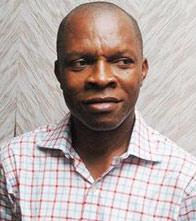
Patrick Omorodion
I listened to the Sports Development Minister, Senator John Enoh delivering his opening speech to declare open the 8th National Youth Games in Asaba on Thursday. He talked about using the Games to discover young talents who would be nurtured to stardom to replace the aging national athletes.
What immediately played back in my head was Jimmy Cliff’s song, ‘Going Back West’. And the lines that struck me in the song goes thus: I met a businessman who said he got some friends back East.
Said, “Why don’t you come along? Well we could help you at least, make you into a big star by playing your guitar”.
So the right thing to do to realize Senator Enoh’s dream of using the National Youth Games to discover talents who would then be nurtured to become stars is by going back west like Jimmy Cliff crooned, in this case, school sports that is the real nursery for catching them young.
We had a National Schools Sports Federation, NSSF, but like every aspect of the Nigerian life, it has been neglected by the authorities who careless or don’t think that sports is worth giving any attention.
So if Senator Enoh means what he declared on Thursday at the National Youth Games, he should call his directors and ask from them what happened to the NSSF.
During his recent interview with Arise Television I monitored in Lagos, the minister talked about liaising with his Education counterpart to see how they can resuscitate school sports in the country. That is truly the way to go if we are really serious about discovering new talents to replace the aging ones.
Sports and Education go hand in hand and this is the system that has made the United States a force in sports worldwide.
And they do this through the National Collegiate Athletic Association, NCAA. This body prioritizes student-athletes’ academics, their well-being and fairness so that they can succeed on the field in the classroom and for life. This is what our own NSSF should be modelled after.
Through the NCAA, college athletes are registered and checks show that nearly half a million college athletes make up over 19,000 teams that send more than 57,000 participants to compete each year in the NCAA’s 90 championships in 24 sports.
The organization is not run as a government agency nor by government officials but by members drawn from the member schools who have their various roles spelt out.
To represent the United States in any sport or for example to even be drafted to play basketball in the lucrative NBA, you must have passed through the NCAA or still active in its competitions.
Records show that in the recently concluded Paris Olympics and Paralympics Games, NCAA athletes, both past and present played a great role in Team USA’s success, they reportedly contributed about 300 medals.
With the death of school sports in Nigeria, the only institution that is trying to run education together with sports is the Segun Odegbami International College & Sports Academy, SOCA situated in the serene Wasimi village of Ogun State.
SOCA is a multi-sport academy, whose specialized academies are in football, basketball, tennis and track & field, among a few other disciplines.
Senator Enoh and the Delta State governor, Sheriff Oborevwori harped on the need of ridding the Youth Games of age cheats. This could be curtailed through the synergy between the Education ministry and the schools which have records of the students.
Another hint given by the sports minister on sustaining the Youth Games is returning the age limit to U-17 years from the present U-15 years.
I think countries which are power houses in sports like the United States, Britain and China don’t wait till children get to 15 or 17 before they start participating in sports.
Children get introduced to sports as early as four or five years hence you get some of them getting to represent their countries as early as 12 years at the Olympics in a sport like gymnastics.
If talents are discovered very early and competitions are introduced for U-13, U-15 and U-17 categories, the country will have a big reservoir of athletes ready to fill the vacuums created when the older ones retire.
The sports ministry should also look into the Cuban model of having three categories of athletes at every given time, junior. intermediate and elite.
And it will please him to know that the ministry has the blueprint on their shelve as a former Director General of the Sports Commission, NSC, Chief Patrick Ekeji commis- sioned a group of technocrats including retired Major-Gen- eral Gregory Adebiyi and Al-Hassan Yakmut who later also rose to be the DG of the NSC to study the Cuban system in 2003 and they produced a report on it.
As one of those who was with Team Nigeria at that training tour of Cuba before the 2003 African Games and have an idea of the model, I know that Cuban athletes have everything going for them.
From infrastructure, which are modest and aplenty both for training and competitions, to coaching which is very professional, nutrition, physical training, psychology and welfare, insurance inclusive, the Cuban athletes are treat- ed like kings and queens because they are the major stakeholders.
In Cuba, athletes are almost always training or competing in national, continental or world championships all year round and only have the luxury of a three-month holiday window.
This way athletes can graduate from junior through intermediate to senior categories seamlessly. Nigeria can adopt this model especially for those ones whose main stay for living is sports at full-time.
Like the saying goes, early to bed, early to rise. If talents are discovered early from young ages and are nurtured through schools sports, they will become world beaters with hard work.
Disclaimer
Comments expressed here do not reflect the opinions of Vanguard newspapers or any employee thereof.